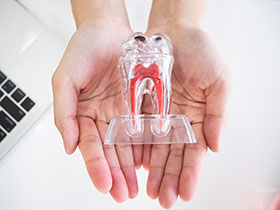Book an Appointment
(02) 93 000 999
A root canal treatment, also known as RCT, is a procedure that repairs and saves an infected tooth.
During the treatment, your tooth’s infected pulp will be removed and the infection inside of your tooth is cleaned out, treated, removed and replaced with a filling. If left untreated, the tissues surrounding the tooth will become infected, you may lose your tooth and the infection may spread to other parts of your body.
If you have a toothache, don’t delay seeing your dentist as a minor toothache can be the first sign of a major tooth infection.
Even though ‘best practice’ techniques are adopted during the treatment, in some cases complications may emerge.
Although there are several main root canals in your tooth, there may be accessory canals, tubules and undiscovered canals, some of which are very hard to reach with any cleaning equipment. Accordingly, we simply may not be able to fully sterilise the entire root canal system.
During root canal treatment, a file (the instrument used to clean the canals) can break inside the canals and retrieval of this broken instrument may not be possible.
Perforation of the tooth can occur as well, particularly if your tooth has complex anatomy or it is difficult to access all the canals.
Undetected cracks in the root or an inadequate restoration may also cause complications allowing bacteria to enter the tooth and re-contaminate it.

Breakdown of the final filling can also occur in some cases and this can lead to re-infection of the root canal system, therefore the importance of regular check-ups must be (is) emphasized.
Depending on the complexity of the root canal system and the problem presented, you or your dentist may decide that your case should be handled by an Endodontist (a dental specialist that specialises in root canal treatment).
If the tooth becomes infected again, a second root canal treatment may be rewuired to resolve the issue. Other endodontic procedures such as apicoectomy can also be considered.
As with any dental procedure, surgical or invasive procedures on teeth carries inherent risks. At Dentist Mandy, we are dedicated to discuss all aspects of root canal and endodontic treatment with you prior to the commencement of the treatment.
For more detailed information about root canal treatment, you can visit Australian Society of Endodontology http://www.asensw.org.au, or read this article http://www.asensw.org.au/wp-content/uploads/2014/11/m68351_v1_what-is-endo-combinded_final.pdf
Toothache is often caused by a root infection. The inside of your tooth is called the pulp. The pulp contains blood vessels and nerve fibres, and is normally protected from bacteria. If the enamel and dentine of the tooth becomes compromised, bacteria can enter and infect the tooth, causing pain and toothache.
It is important to have a good discussion with your dentist about the prognosis for any infected tooth, so an informed decision can be made on what treatment should be done to stop the toothache.
Trauma, tooth decay, gum disease and cracked fillings can cause tooth infection, which may lead to root canal treatment. Here are a few indications:

If your tooth is hit by something, or if you bite down on something causing a fracture or split, bacteria will be able to enter the tooth, causing tooth infection.
If there is a large hole in your tooth that may be caused by sugary or acidic foods and drinks, bacteria can enter the pulp, causing tooth infection.
When your gums detach from the tooth due to gum disease, it creates a gap. Bacteria would then be trapped between the tooth and gum, which could access the root canals of the tooth containing nerves and blood vessels, causing tooth infection.
A filing usually keeps bacteria out of the inside of the tooth. If a filling cracks, then bacteria can get down the crack and into the pulp of the tooth, causing tooth infection.
If you experience fever and toothache, have swollen gums, jaw and neck glands or a sinus tract as well, you should seek treatment from a dentist as soon as possible.
Root canal treatment enables your natural tooth to be retained, having both cosmetic and dental benefits. If your tooth was extracted, leaving an empty space, your teeth next to it or opposite it will begin to shift, causing your teeth to become misaligned, crooked or crowded or even having gum and jaw problems from changes in your bite.
Replacement teeth or bridges and implants can be more expensive than root canal treatments and may require even more treatment time and additional work on adjacent teeth.
Nothing is better than having your natural, healthy teeth in place.
During the first few days or weeks post-treatment, you may experience some pain, sensitivity or discomfort on your tooth due to remaining inflammation. This can usually be managed with over-the-counter pain medication. Sometimes, your dentist will also prescribe antibiotics depending on the circumstances.
The pain and tenderness should eventually subside after the completion of root canal treatment. Good oral hygiene with regular flossing and brushing teeth should be maintained to keep all your teeth and gums healthy, particularly the tooth that has received root canal treatment completed. Regular appointments should also be made to make sure the tooth is health and overall oral health is good.
